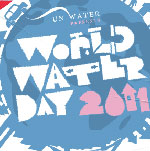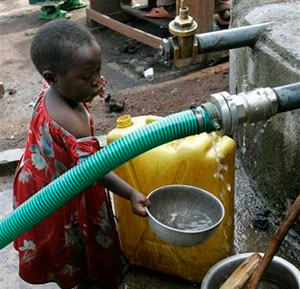
Africa's water crisis is one of the main topics of the 2011 World Water Weelk in Stockholm

FRONT PAGE
Site Search
About us | Quiénes somos |
A propos de nous | Über uns |
Code of Ethics
Mayor Monitor
Directories
Events
Debate

Africa's water crisis
World's most polluted places
Greenhouse gas emissions
Green cities initiative
Europe's greenest cities
Coastal floods threaten cities
Green mayors
Urban ecological footprint

City Mayors reports news from towns and cities around the world. Worldwide | Elections | North America | Latin America | Europe | Asia | Africa |

Mayors from The Americas, Europe. Asia, Australia and Africa compete for the World Mayor Award. More

City Mayors ranks the world’s largest, best as well as richest cities and urban areas. It also ranks the cities in individual countries, and provides a list of the capital cities of some 200 sovereign countries. More

City Mayors profiles city leaders from around the world. More

City Mayors describes the history, architecture and politics of the greatest city halls in the world. More
Use Mayor Monitor to rate the performance of mayors from across the world More

In your opinion: Praise Criticise. Write

City Mayors reports political events, analyses the issues and depicts the main players. More

City Mayors describes and explains the structures and workings of local government in Europe, The Americas, Asia, Australia and Africa. More

City Mayors deals with economic and investment issues affecting towns and cities. More

City Mayors describes and explains financial issues affecting local government. More

City Mayors reports urban environmental developments and examines the challenges faced by cities worldwide. More

City Mayors reports on and discusses urban development issues in developed and developing countries. More

City Mayors reports on developments in urban society and behaviour and reviews relevant research. More

City Mayors invites readers to write about the people in their cities. More
City Mayors examines city brands and marketing. More

City Mayors lists and features urban events, conferences and conventions aimed at urban decision makers and those with an interest in cities worldwide. More

City Mayors deals with urban transport issues in developed and developing countries and features the world’s greatest metro systems. More

City Mayors examines education issues and policies affecting children and adults in urban areas. More

City Mayors investigates health issues affecting urban areas with an emphasis on health in cities in developing countries. More

City Mayors reports on how business developments impact on cities and examines cooperation between cities and the private sector. More

City Mayors examines the contributions history and culture make to urban society and environment. More

City Mayors examines the importance of urban tourism to city economies. More

City Mayors questions those who govern the world’s cities and talks to men and women who contribute to urban society and environment. More

City Mayors profiles national and international organisations representing cities as well as those dealing with urban issues. More

City Mayors reports on major national and international sporting events and their impact on cities. More

City Mayors lists cities and city organisations, profiles individual mayors and provides information on hundreds of urban events. More
Access to drinking water remains
urban Africa’s number one priority
By Michel Makpenon*
17 June 2011: Access to running water remains in a state of crisis for a huge number of people across Africa. With growing urbanisation across the continent, African cities will need the political determination to ensure sustainable water resources based on social need rather than commercial concerns.
| Water crisis | Methods of supplies | Challenges | Recommendations |
The water issue is a major problem for people in sub-Saharan Africa. Indeed, the water situation in sub-Saharan Africa remains characterised by the difficult access to this resource, the poor supply management of watering places and the high costs of water network connections. For instance, in Benin one household in three doesn’t have access to drinking water, and the problem is much more acute in rural areas.
Households having access to drinking water are considered as households who have drinking water at home or within 200 metres from home: running water from the company’s distribution network, fountain water, water from the village pump, water tank and water from protected wells.
Various consultations led with the populations have indeed confirmed that the water issue is a major problem for them. The concerns, as raised by the populations, focus on the difficult access to water and the poor management of the watering places, the difficulties to call for the financial participation of the population for the creation and the management of watering places and the borehole characteristics which are too often inappropriate: even if this water is neither used for drinking nor for cooking, it is nevertheless inappropriate.
The water crisis
The water crisis in cities is increasingly the subject of special attention in all international conferences on water. The alarm was raised in Dublin and Rio de Janeiro in 1992 and continued to resound in other meetings such as Beijing and Istanbul in 1996, in Cape Town in 1997 and at the Second Global Forum on Water held in the Hague in 2000. In most of these meetings, the water crisis in African cities has been one of the main concerns.
Globally, Africa is urbanising at a rate of about 5 per cent, the fastest rate in the world. The urban population in Africa could rise from 138 million in 1990 to 500 million in 2020, and African cities with over 1 million inhabitants will then have to accommodate nearly 200 million people. Regarding water, a survey conducted in 1990 in 29 sub-Saharan countries showed that eight of these countries suffered from a shortage or a scarcity of water. According to estimates, in 2025, that number should increase to 20 out of 29.
For instance, Lagos, the commercial centre of Nigeria, the African country with the largest population, has nearly 14 million inhabitants, that is to say half the population of Kenya and more that most African countries. It is the most populated city in Africa – Lagos is the sixth-largest city in the world and could become the third-largest in two decades. This would require greater access to water supply and to other infrastructures as well as essential services for millions of additional inhabitants. Moreover, as in many other African countries, Lagos is about to face a real water crisis.
Methods of supply
 Access to clean water in Africa does not correspond to that of Europe.
Access to clean water in Africa does not correspond to that of Europe.
In fact, a small proportion of the population has access to drinking water and the water service is not restricted to the conventional networks, as there are still other drinking-water sources available such as communal water points (springs), wells and boreholes.
Water from the natural environment (oceans, lakes, rivers, creeks, groundwater, rains) is a collective good. It belongs altogether to no one and to everyone. Considered as a natural resource, water has multiple utilisations: agriculture (70 per cent), industry (20 per cent) and domestic consumption (10 per cent).
Water management is complex. It is a cross-cutting resource because it affects altogether health, urban development, agriculture, industry and leisure. It also has multiple stakeholders and has to be approached on a territorial basis too.
Management of water services is rather complicated. It requires high technical ability, permanent adaptation to changing conditions and important funds, because of the high cost of infrastructure and equipments, together with permanent maintenance needs.
Although water management has often been transferred to local authorities in Africa, resources themselves were not transferred. Water companies are still in charge of water management in African cities, but without adequate consultation with local authorities.
In the case of Cotonou - Benin’s largest city with a population of some 760,000 people - access to drinking water seems secured, but some neighbourhoods still remain without water supply.
Almost everybody has access to drinking water. Nevertheless, only 44 per cent of people have running water at home and 55 per cent of them will buy running water from nearby homes. The water from the Société national des eaux du Bénin (SONEB) and elsewhere - which comes from fountains, district pumps, tanks or protected wells - is considered as running water at home.
Proper fountains or fitted-out watering places almost do not exist anymore in the city of Cotonou. But households, which have no connections at home stock up buckets of water bought in a nearby house.
Cotonou populations often face water cuts, which sometimes last all day. The company in charge of water distribution explains that this problem is due to the maintenance of the network and to power cuts. But the investigations showed that 20 years ago the German firm GIGGS had forbidden the urbanisation of the area around the pumping stations because it might damage the groundwater. But the advice given by the firm was not followed and the area was largely urbanised, causing damage to the groundwater and thus to the water supply company. This led the distribution company to increase the price of drinking water. Leaders of the company usually explain that these adjustments are due to the international financial crisis and to the high maintenance costs.
In accordance with article 93 of the law 97-029, dated 15 January 1999 and concerning the organisation of cities in the Republic of Benin, the town is responsible for the supply and the distribution of drinking water. But this has never been respected whereas it might have encouraged competition and enabled populations to have a say.
Challenges
For a good water management policy in African cities, several challenges have to be met, such as:
• the implementation of laws and regulations giving water management to local communities
• the knowledge of water sources
• the development of a framework for the management of surface water resources
• the necessity of financial means and human resources to monitor and operate the equipments
• informing and educating people for a rational use of watering places.
Recommendations
To improve people’s access to drinking water, African cities need support in the following areas:
• the control, the development and the water supply based on the principle of demand
• the management and the rational exploitation of water resources
• the training and re-training of communities as well as the establishment of a process concerning equipments renewal
• the strengthening of the drinking water supply systems
• the establishment of a high council for water
• the setting-up of a water fund for a real management of the resource
• the establishment of monitoring and evaluation mechanisms.
* Michel Makpenon works in Cotonou, Benin, as a statistician in engineering economics
Comment on this article
Read comments

